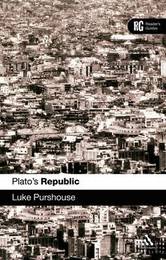
|
Plato's Republic: A Reader's Guide
Paperback / softback
Main Details
| Title |
Plato's Republic: A Reader's Guide
|
| Authors and Contributors |
By (author) Dr. Luke Purshouse
|
| Series | Reader's Guides |
|---|
| Physical Properties |
| Format:Paperback / softback | | Pages:168 | | Dimensions(mm): Height 216,Width 138 |
|
| ISBN/Barcode |
9780826474674
|
| Classifications | Dewey:321.07 |
|---|
| Audience | |
|---|
|
Publishing Details |
| Publisher |
Bloomsbury Publishing PLC
|
| Imprint |
Continuum International Publishing Group Ltd.
|
| Publication Date |
10 October 2006 |
| Publication Country |
United Kingdom
|
Description
Plato's Republic is arguably the most famous and influential work of philosophy ever written. It is certainly among the most widely read and studied, a staple of undergraduate courses that continues to inspire and inform contemporary debates in political philosophy. As such, it is a hugely important and exciting, yet challenging, piece of philosophical writing. In Plato's 'Republic': A Reader's Guide, Luke Purshouse offers a clear and thorough account of this key philosophical work. The book sets Plato's work in context, introduces the major themes and provides a detailed discussion of the key sections and passages of the text. Purshouse goes on explore some of the areas of thought that the Republic has impacted upon and provides useful information on further reading. This is the ideal companion to study of this most influential and challenging of texts.
Author Biography
Luke Purshouse formerly lectured in Philosophy at Cambridge University and is now Head of Politics at Eton College, UK.
Reviews'admirably clear and concise, and extremely well written and well organised ... an excellent introduction to the Republic, especially for those new to Plato.' Giles Pearson, Fellow and Director of Studies in Philosophy, Christ's College, University of Cambridge 'Luke Purshouse provides a compelling introduction to the central concerns of Plato's Republic ...Readers will no doubt appreciate this exemplary book - an indispensable guide for students of Plato.' Alexandra Kolb, University of Otago, New Zealand
|